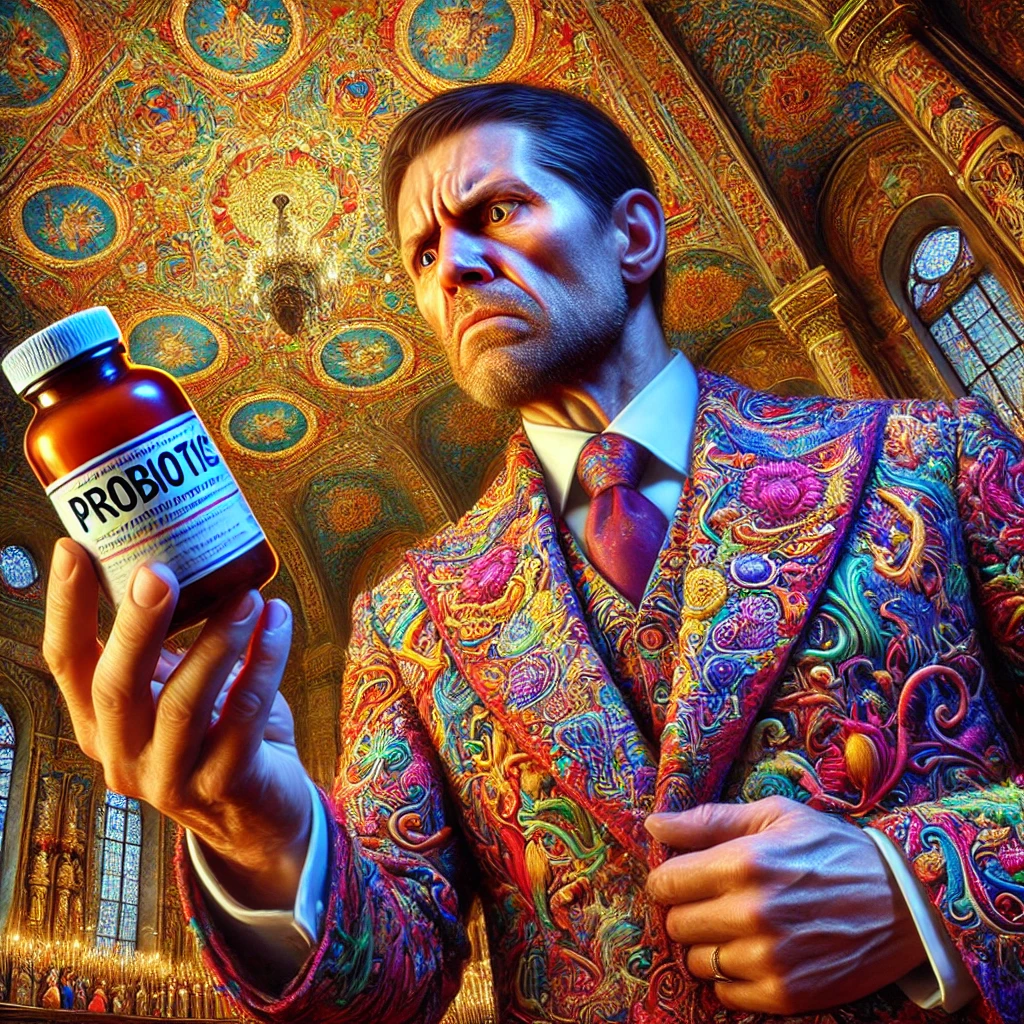Lactobacillus Makes Histamine Intolerance Symptoms Worse
 When I first developed histamine intolerance symptoms, I tried various probiotics containing lactobacillus. Unfortunately, I reacted to nearly all of them at some point. This confused me because I thought all probiotics were good for you. Little did I know that when you have histamine intolerance, this is definitely not the case. For this reason, I want to share my experiences to help you avoid any unnecessary suffering.
When I first developed histamine intolerance symptoms, I tried various probiotics containing lactobacillus. Unfortunately, I reacted to nearly all of them at some point. This confused me because I thought all probiotics were good for you. Little did I know that when you have histamine intolerance, this is definitely not the case. For this reason, I want to share my experiences to help you avoid any unnecessary suffering.
In this article, I will discuss the importance of balancing lactobacillus with other species in the gut. Also, I will cover why lactobacillus can be dangerous if you have histamine intolerance. In addition, I will cover some common questions about lactobacillus and histamine intolerance. This will give you all the information you need to make the right decisions so you can improve your histamine intolerance symptoms.
Key Species of Beneficial Bacteria
Lactobacillus
This species of bacteria provides many valuable benefits. It is critical for extracting nutrients, resisting pathogens, and plenty more. Some lactobacillus strains are beneficial for modulating the immune system, but unfortunately, others increase histamine. In addition, lactobacillus has other characteristics that can cause people problems with histamine intolerance. I will cover all of these in the section below.
Bifidobacterium
Bifidobacterium is the most important species of beneficial bacteria. It degrades histamine and is the best at calming down the immune system. In addition, it is a big producer of short-chain fatty acids, which are critical to suppressing inflammation system-wide. Also, it attaches to the gut lining, eliminating pathogens through competitive exclusion. As I reiterate over and over, this is the most important species if you want to beat histamine intolerance.
Akkermansia
Akkermansia is an important species in the gut that supports mucin production and reduces inflammation. Mucin production is critical to keeping the gut lining healthy. This keeps the mucus layer thick enough to resist threats in the gut that could otherwise trigger epithelial inflammation. When levels of akkermansia become low, you are at a greater risk of damage to the intestinal barrier and leaky gut.
How Lactobacillus Worsens Histamine Intolerance
Histamine Production
Certain lactobacillus strains like l. reuteri, l. casei, l. bulgaricus and others have been shown to produce histamine as a byproduct of metabolism. Also, when you have histamine intolerance, you may have a histamine reaction to probiotics that contain lactobacillus. In most cases, these probiotics have several lactobacillus strains, so one of them is bound to set you off.
Overactivation of Mast Cells
Some lactobacillus strains directly trigger mast cells to release histamine and other inflammatory molecules. In addition, lactobacillus can produce histamine as a byproduct, which makes the mast cells even more activated. If you don’t have enough Bifidobacterium to keep things in check, chronic inflammation will start to take over.
Disrupts Microbiome Balance
When you have histamine intolerance, you typically have high lactobacillus levels already. The more you feed this population, the more you will be disrupting the balance of your gut. Unfortunately, there are only so many seats available on the gut lining. For this reason, you must encourage bifidobacterium any chance possible if you have histamine intolerance. This can counterbalance lactobacillus’s immune-triggering effects and support other immune-modulating bacteria’s growth.
Excess Lactic Acid Production
Lactobacillus produces lactic acid as a byproduct when foods are fermented. When levels of lactic acid get too high, the pH can drop. If the gut is too acidic, it can lead to overgrowth of pathogens like Candida albicans. Also, the acidic pH can irritate the gut lining, leading to leaky gut and food sensitivities.
Promotes the Development of SIBO
Excessive levels of lactobacillus in your gut can lead to SIBO-like symptoms. When your levels of lactobacillus are too high, it could become the dominant bacteria that breaks down your food. If this occurs, it can put you at risk for bloating, abdominal pain, constipation, and more. Lactobacillus is supposed to break down some of your food, but it shouldn’t be a significant portion because of the inflammatory byproducts it can produce.
Increased Gut Permeability
When you have an overgrowth of lactobacillus, it can lead to an overproduction of inflammatory byproducts, like lactic acid and histamine. Unfortunately, these can irritate the gut lining, which puts you at risk for leaky gut. To balance this out, you must have sufficient akkermansia to restore the mucosal barrier and Bifidobacterium to reduce the inflammation.
Excessive Immune Stimulation
People with chronic illnesses often have overstimulated immune responses, which lactobacillus can aggravate further. Lactobacillus produces histamine, IL-6, TNF-alpha, and other inflammatory chemicals. In contrast, Bifidobacterium degrades histamine and stops the mast cells from secreting inflammatory molecules.
Reduced DAO Enzyme Levels
Lactobacillus overgrowth may lead to its deficiency in key nutrients required to produce DAO. For example, b6 and zinc may become depleted. Also, since too much lactobacillus can cause a higher probability of food sensitivities, you can become deficient in magnesium.
Every time your body reacts to food, it releases magnesium to calm down. Eventually, these storages run out in your left with low levels of intracellular magnesium. This further impairs the production of DAO, which makes histamine intolerance that much worse.
Neurological Inflammation
When you have too much lactobacillus, it can lead to high histamine levels. This causes dysfunction in the neurotransmitters and leads to neurological inflammation. Studies have shown that people with mental health disorders have higher levels of lactobacillus than normal. In addition, they lack other immune-modulating bacteria like Bifidobacterium.
Examples of conditions associated with high lactobacillus are depression, anxiety, bipolar disorder, autism, schizophrenia, and PTSD (1). This is quite an intimidating list if you are considering using lactobacillus. The reality is, if lactobacillus is not balanced properly, it can turn against you.
Unpredictable Immune Reactions
Some people with histamine intolerance can have immune reactions to lactobacillus probiotics. I experienced this myself and saw this in my daughter and many clients. In fact, this is the primary reason I’m writing this article. If there is too much of something, the body will react differently than if there is too little. Once you hit that threshold with lactobacillus, it starts to reject it from external sources.
Keep in mind that it’s not as much about the amount of lactobacillus you have as it is about the lack of other beneficial bacteria that would balance it out. To restore normalcy, lactobacillus must be balanced out with bifidobacterium, akkermansia, and other commensal bacteria.
FAQ- Lactobacillus and Histamine Intolerance
Do all lactobacillus strains increase histamine?
A few lactobacillus strains are histamine neutral, but many produce histamine themselves or convert the amino acid histidine to histamine, which increases levels. The safest strains are lactobacillus rhamnosus, l. plantarum, and l. acidophilus. Other than these strains, I would be careful. This is why, in most cases, I completely avoid lactobacillus when working with people with chronic illnesses.
Are lactobacillus levels low when you have histamine intolerance?
Typically, people with histamine intolerance have low levels of bifidobacterium/akkermansia and moderate levels of lactobacillus. For this reason, you don’t want to supplement with any probiotics which contain lactobacillus. This can make the imbalance of good bacteria even worse, which will increase histamine intolerance symptoms.
Which lactobacillus strains are safe for histamine intolerance?
In my experience, none of the lactobacillus strains are 100% safe for people with histamine intolerance. If I had to choose one, it would be lactobacillus rhamnosus GG. This has been shown to stabilize mast cells, reducing their histamine release (2). Even with this, I would make sure not to overdo it. Rather than focusing on lactobacillus, redirect your attention to Bifidobacterium. It will be your main ally in your quest to overcome histamine intolerance.
Are prebiotics helpful for histamine intolerance?
Absolutely! As long as the prebiotics have been shown to boost bifidobacterium, they are typically helpful for histamine intolerance. My favorite prebiotics are apple pectin, acacia senegal, arabinogalactan, inulin, colostrum, and bee propolis. All of these have been shown to increase the growth of bifidobacterium, and many have even been shown to suppress pathogens.
What probiotic strains are most important for histamine intolerance?
Bifidobacterium is the most important species to repopulate when you have histamine intolerance. The reason is, bifidobacterium degrades histamine and keeps the mast cell in the gut calm. This leads to a much healthier gut environment and improved histamine intolerance symptoms.
Why are most probiotics risky for histamine intolerance?
Most probiotics contain bacterial strains that either produce histamine or increase it indirectly. Unfortunately, it’s extremely difficult to find a probiotic with just bifidobacterium in it. After searching for quite some time, I eventually found Probiota Bifido by Seeking Health. This is the best product I have seen. For some people, it can be an absolute game changer.
What dietary changes can I make to balance my gut microbiome?
By implementing more plant fibers, you will encourage the growth of Bifidobacterium and other immune-modulating bacteria. If you continue to eat animal products multiple times per day, you will encourage the growth of Lactobacillus.
Conclusion- Lactobacillus is Risky for Histamine Intolerance
When you are trying to beat histamine intolerance, you don’t want to put something in your body that PRODUCES HISTAMINE. Also, you don’t want to trigger your immune system into a flare. For these reasons, I would be HIGHLY suspicious of any supplement that includes lactobacillus. Instead, try balancing your gut with bifidobacterium and prebiotics. The reality is, they’re not only more effective, but they’re safer too!
If you have any questions about histamine intolerance, get in touch. I’m willing to help and blessed to have the opportunity.
Happy healing everyone!
Matt Nedin
Certified Holistic Nutritionist
EndSickness – Founder
Phone: (734) 846-8619
Email: endsickness@gmail.com
WhatsApp: +17348468619










